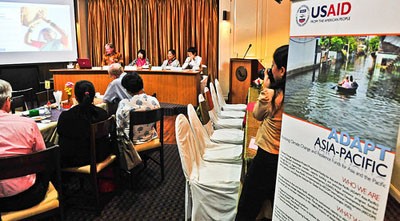
For Immediate Release
BANGKOK, December 2, 2014 – Today, the United States Agency for International Development (USAID) Regional Development Mission for Asia launched an online gender sourcebook for engineers, economists, social scientists, local government officials and other specialists who design large-scale climate change adaptation projects for funding. Using the sourcebook can help ensure that climate funding is channeled toward improving the status of women in some of the least developed countries in Asia and the Pacific.
Developed by the USAID Adapt Asia-Pacific project, the Online Sourcebook for Integrating Gender in Climate Change Adaptation Proposals is a compilation of resources to help development partners incorporate gender considerations and women’s empowerment as fundamental opportunities in their country’s adaptation projects that can lead to greater resilience.
“The issue of gender equality in climate change adaptation is as much about efficiency and effectiveness of limited resources, as it is about equality and equity,” said Michael Yates, Director of the USAID Regional Development Mission for Asia. “Given that many women are primarily responsible for ensuring their families have water, food and fuel – all natural resources likely to be impacted by climate change – they clearly have a unique contribution to make to adapt their communities to a changing climate.”
The impacts of climate change – drought, floods, extreme weather, and reduced food and water security – severely affect the most vulnerable groups, particularly women who are often dependent on natural resources threatened by environmental change.
Gender equality is a top priority for USAID. It is also becoming increasingly important as a requirement for international climate funds, as demonstrated by the Green Climate Fund’s recent adoption of a gender-sensitive approach to project preparation and funding.
The online gender sourcebook enables development experts to design gender responsive climate change adaptation projects, particularly in developing countries, by providing targeted gender-related information and real-life examples to follow. The sourcebook is organized into specific sectors, such as agriculture, coastal management, biodiversity conservation, energy, and transportation, for easy reference.
The sourcebook is a live document that will be continually updated with information provided by users through a built-in feedback function. It is hosted by the region’s leading climate change adaptation knowledge platform – the Asia-Pacific Adaptation Network (APAN).
Visit and read the online gender sourcebook at: http://asiapacificadapt.net/gender-sourcebook/







Comment
Make a general inquiry or suggest an improvement.